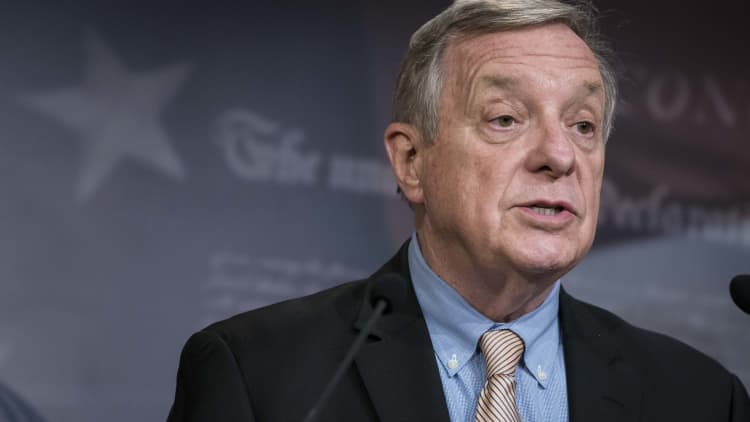
The second-ranking Senate Democrat on Thursday denied that Congress rescued airline shareholders by passing a $50 billion industry bailout last week.
Lawmakers approved the taxpayer aid as part of a $2 trillion coronavirus relief package, the largest emergency spending plan in U.S. history designed to limit the economic destruction from the coronavirus pandemic. Commercial airlines have seen a dramatic drop in customers as the outbreak proliferates.
Pressed in a CNBC interview about whether elected officials put the concerns of airline shareholders over small businesses, Sen. Dick Durbin of Illinois said corporate stakeholders did not get preferential treatment. The Senate minority whip, whose state is home to United Airlines' headquarters, said he is "worried about the workers, the pilots, the flight attendants, the people in charge of maintenance."
"We've attached a lot of strings in terms of how this money's going to be spent and how these airlines are going to conduct their business after we see an end to this," Durbin told "Squawk Box."
"To say that we're rescuing shareholders — you know these stock prices are taking a beating and I don't think there's any rescue that's come through for these shareholders yet," he continued.
The $2 trillion stimulus package creates a $500 billion fund to help severely distressed businesses. Within that fund, $50 billion in aid is earmarked for passenger carriers, half in direct payments and the other half in loans and guarantees.
The law stipulates the companies have to use the grants exclusively for employee wages, salaries and benefits. They also have to temporarily stop stock buybacks and dividend payments to receive aid.
The legislation sets aside $8 billion for cargo carriers, half in direct payments and the other half in loans. It also provides $1 billion to $3 billion for the health costs of airline contract caterers.
But the structure of loans to airline carriers has yet to be determined, and airlines have until Friday to submit their proposals to the Treasury Department. Treasury Secretary Steven Mnuchin and others in the Trump administration have repeatedly said they want the government to make money off any aid to airlines, and that could be through equity stakes.
Members of Durbin's party have questioned the wisdom of the airline aid. They worry the bill did too much to boost struggling corporations but not enough to help Americans scrambling to cover bills after losing their jobs.
Airline stocks have taken a drubbing during the coronavirus crisis. Shares of industry titans United, Delta and American had plunged 58%, 49% and 43%, respectively, in the past month ahead of Thursday's stock market open.
While the companies' shares climbed in the days leading up to passage of the relief bill, they tailed off again in trading early this week.
Lawmakers have started to look ahead to another coronavirus response bill after the stimulus package, the third piece of emergency legislation approved during the pandemic. COVID-19 cases in the U.S. have topped 200,000, and roughly 10 million people filed new jobless claims in the past two weeks as businesses across the country shutter.
Durbin unequivocally called for a new bill Thursday, even as Republican leaders in the chamber say they want to wait to see how effective the last rescue bill is.
"I'm prepared to vote for more, period. No ifs, ands or buts about it," he said.



